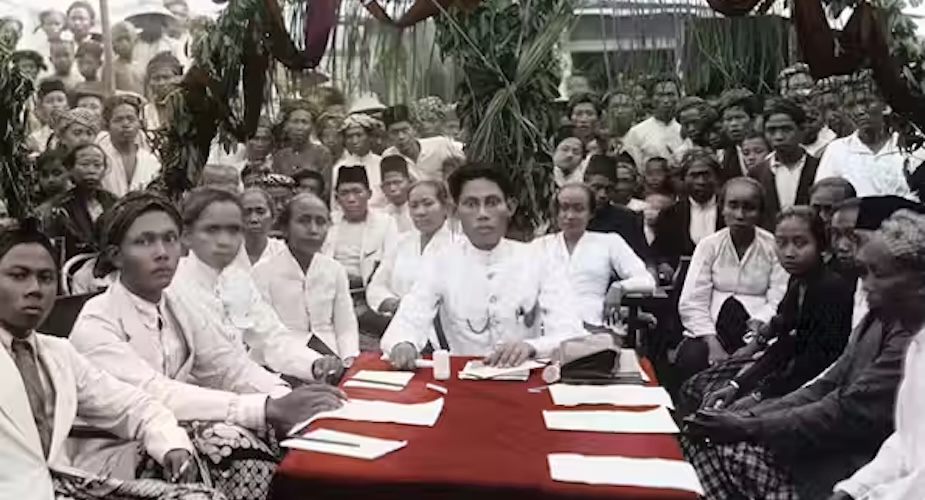The Australian government needs to control Australian miners in Indonesia
Jeff Atkinson
A large proportion of foreign mining companies in Indonesia are Australian. They may be generating badly needed funds for the country, but the cost to those living near these mines has been very high.
Indonesia is rich in mineral resources. It desperately needs the income that exploiting these resources can bring. In 1998 the mining industry contributed some US$ 9,573 million to the Indonesian economy, and US$ 570 million to government revenue. Minerals and related products accounted for 19 percent of total Indonesian export revenue, and generated over US$ 3,000 million in export revenue.
But who benefits most from this, and who has to bear the cost? Under the Suharto government, and still today, local communities living around the mine have borne the heaviest burden.
Communities already on the poverty line lose the land, the source of their livelihood, to the mine, usually without sufficient compensation to allow them to maintain an adequate income. Others have lost valuable income from small-scale and artisanal mining when the authorities declare it illegal in the company's concession area. Rivers on which they depend have become unusable because of pollution; the fish disappear and the river water causes rashes and itchiness when people try to bathe in it. Those who object to any of this feel the heavy hand of the police Mobile Brigade.
At the Indo Muro mine in Central Kalimantan, operated by Perth-based Aurora Gold Ltd, the problem was the loss of land by indigenous Dayak people, and the loss of income from small-scale and artisanal mining. At the Barisan mine in South Sumatra, owned by another Perth-based company, the complaint is pollution of the rivers by run-off from the mine.
At Rio Tinto's Kelian gold mine in the upper reaches of the Mahakam River in East Kalimantan there have been human rights abuses. In July 2000 the Indonesian Human Rights Commission released a report that, among other things, highlighted sexual abuses against local women and female employees at the mine. Some of the victims were under-age and the majority of these, according to the report, are alleged to be the victims of an Australian who was the mine manager at the time.
It is of course not just Australian companies that are causing problems. The operations of PT Freeport Indonesia in West Papua, majority-owned by US-based Freeport MacMoRan, have become notorious for their massive environmental damage from riverine waste dumping and gross human rights violations against local groups who resist.
All of these operations were established under the Suharto regime, when negotiating access to land with local landowners was not necessary and companies left community relations to the government and the Mobile Brigade. Now with Suharto and his political apparatus largely gone, many of these companies are paying the price of appalling community relations and unjust treatment from which they benefited. Local communities have become much more demanding and aggressive, and many operators have seen their mines over-run by large numbers of illegal miners.
Voluntary code
What has been the response of the mining industry in Australia to all this? It is well aware that the problems are not confined to Indonesia, and that Australian mining companies have been engaged in sub-standard practices in many countries. In Papua New Guinea for example, it was revealed in 1999 that the environmental impact of the Ok Tedi mine, 52 percent owned by BHP, was far worse than had been expected, and that none of the possible solutions that had been investigated were feasible. Most notorious of all was the massive cyanide spill early in 2000 at the Australian-owned Esmerelda mine in Romania, which had a cataclysmic effect on fisheries in nearby Hungarian rivers.
There is certainly a realisation within the industry that they need to 'lift their act', that community expectations in the home country and the demands of communities in the host country are such that this kind of performance is no longer acceptable. But their approach is to allow improvement to occur at a rate that the industry is happy with, rather than one that the protection of people's fundamental rights demands.
The preferred approach of the industry body, the Minerals Council of Australia, is to encourage companies to work towards the standards set down in its Code for Environmental Management. This has been in place since 1996 and has now been signed on to by some 40 Australian mining companies, including all the major ones. Its strength, says the council's executive director 'lies in the fact that companies volunteer to commit within a framework of principles, and can choose to implement the code in a way that is appropriate to their operations and their environments. The code works because it gives the industry flexibility to choose how it goes about achieving excellence in environmental behaviour.'
The problem is that the code is voluntary, its principles are vague and general, and only refer to the management of environmental effects, not social or economic impacts. There is no monitoring of companies' performance against the code - although there is an obligation for signatory companies to report annually on their own performance. And there are no sanctions for non-compliance. While most of the majors have signed on, large numbers of smaller mining companies have not. Those that want to continue with sub-standard practices will never sign on.
It is not good enough for the industry to set its own rate of change, with no sanction for unacceptable behaviour. What would be the reaction if we applied this approach to other groups in society with the potential to damage the rights of others, eg drivers who drink?
Australian government
The code may have its place as a mechanism for self-improvement by companies, but it is not a substitute for legislation and enforced standards. The Australian government urgently needs to introduce legislation that sets standards for Australian-based mining companies operating overseas, monitors performance and, where possible, imposes sanctions for non-compliance.
An independent complaints mechanism needs to be established able to investigate the complaints of mine-affected communities in Indonesia and elsewhere. In the absence of any such commitment by the industry or government, Community Aid Abroad earlier this year established its own Mining Ombudsman. But this is a responsibility that properly belongs to the Australian mining industry and government, not to a small under-resourced non-government organisation.
Political support for stronger measures by government is growing. In April this year the Australian Labor Party's shadow ministers for foreign affairs, Laurie Brereton, and for environment and heritage, Nick Bolkus, issued a joint media statement in which they 'renewed Labor's call for a comprehensive review of environmental protection standards and practices implemented by Australian mining countries operating overseas'. Mr Brereton added: 'Labor has long supported an active role for government in encouraging Australian companies operating overseas to adhere to public codes which commit them to observe international human rights standards, including core labour standards, and ensure that their operations do not directly or indirectly violate human rights, or inflict unacceptable impacts on local communities and the environment."
In September 2000, Australian Democrats senator Vicki Bourne introduced a private member's bill into the senate that sought to introduce legislated standards for Australian companies operating overseas. This has since been referred to a parliamentary committee, which has announced a public inquiry into the matter.
Congresswoman Cynthia McKinney has introduced a similar bill into the US Congress. The European Parliament recently passed a resolution on EU Standards for European Enterprises Operating in Developing Countries, which would cover companies like Rio Tinto and BP that have gold and coal mines in East Kalimantan.
It is now time for the Australian government to act. Australia's supposed concern for human rights in Indonesia must be extended to include economic and social rights. At the very least it must ensure that it is not Australian companies that are abusing those rights.
Jeff Atkinson (jeffa@caa.org.au) is Advocacy Coordinator with the non-government organisation Community Aid Abroad (Oxfam Australia) and is that organisation's Mining Ombudsman. He is the author of the recent book 'Undermined: The impact of Australian mining companies in developing countries' (Melbourne: Community Aid Abroad, 1998).











